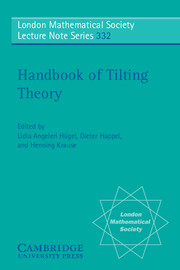Book contents
- Frontmatter
- Contents
- 1 Introduction
- 2 Basic results of classical tilting theory
- 3 Classification of representation-finite algebras and their modules
- 4 A spectral sequence analysis of classical tilting functors
- 5 Derived categories and tilting
- 6 Hereditary categories
- 7 Fourier-Mukai transforms
- 8 Tilting theory and homologically finite subcategories with applications to quasihereditary algebras
- 9 Tilting modules for algebraic groups and finite dimensional algebras
- 10 Combinatorial aspects of the set of tilting modules
- 11 Infinite dimensional tilting modules and cotorsion pairs
- 12 Infinite dimensional tilting modules over finite dimensional algebras
- 13 Cotilting dualities
- 14 Representations of finite groups and tilting
- 15 Morita theory in stable homotopy theory
- Appendix: Some remarks concerning tilting modules and tilted algebras. Origin. Relevance. Future.
15 - Morita theory in stable homotopy theory
Published online by Cambridge University Press: 25 May 2010
- Frontmatter
- Contents
- 1 Introduction
- 2 Basic results of classical tilting theory
- 3 Classification of representation-finite algebras and their modules
- 4 A spectral sequence analysis of classical tilting functors
- 5 Derived categories and tilting
- 6 Hereditary categories
- 7 Fourier-Mukai transforms
- 8 Tilting theory and homologically finite subcategories with applications to quasihereditary algebras
- 9 Tilting modules for algebraic groups and finite dimensional algebras
- 10 Combinatorial aspects of the set of tilting modules
- 11 Infinite dimensional tilting modules and cotorsion pairs
- 12 Infinite dimensional tilting modules over finite dimensional algebras
- 13 Cotilting dualities
- 14 Representations of finite groups and tilting
- 15 Morita theory in stable homotopy theory
- Appendix: Some remarks concerning tilting modules and tilted algebras. Origin. Relevance. Future.
Summary
Abstract
We discuss an analogue of Morita theory for ring spectra, a thickening of the category of rings inspired by stable homotopy theory. This follows work by Rickard and Keller on Morita theory for derived categories. We also discuss two results for derived equivalences of DGAs which show they differ from derived equivalences of rings.
Introduction
Although the usual paradigm in algebraic topology is to translate topological problems into algebraic ones, here we discuss the translation of algebra into topology. Specifically, we discuss an analogue of Morita theory for a thickening of the category of rings inspired by stable homotopy theory. Here rings in the classical sense correspond to ordinary cohomology theories, whereas “rings up to homotopy” correspond to generalized cohomology theories. Although these generalized rings have a considerable history behind them, only recent progress has allowed the wholesale transport of algebraic methods into this domain.
The topological analogue of Morita theory is very similar to the following two algebraic versions. To emphasize this similarity we delay discussion of the technical terminology used in these algebraic statements. We include the third condition below since it is the most familiar criterion for classical Morita equivalences, but we concentrate on the equivalence of the first two conditions in the other contexts.
- Type
- Chapter
- Information
- Handbook of Tilting Theory , pp. 393 - 412Publisher: Cambridge University PressPrint publication year: 2007
- 1
- Cited by



